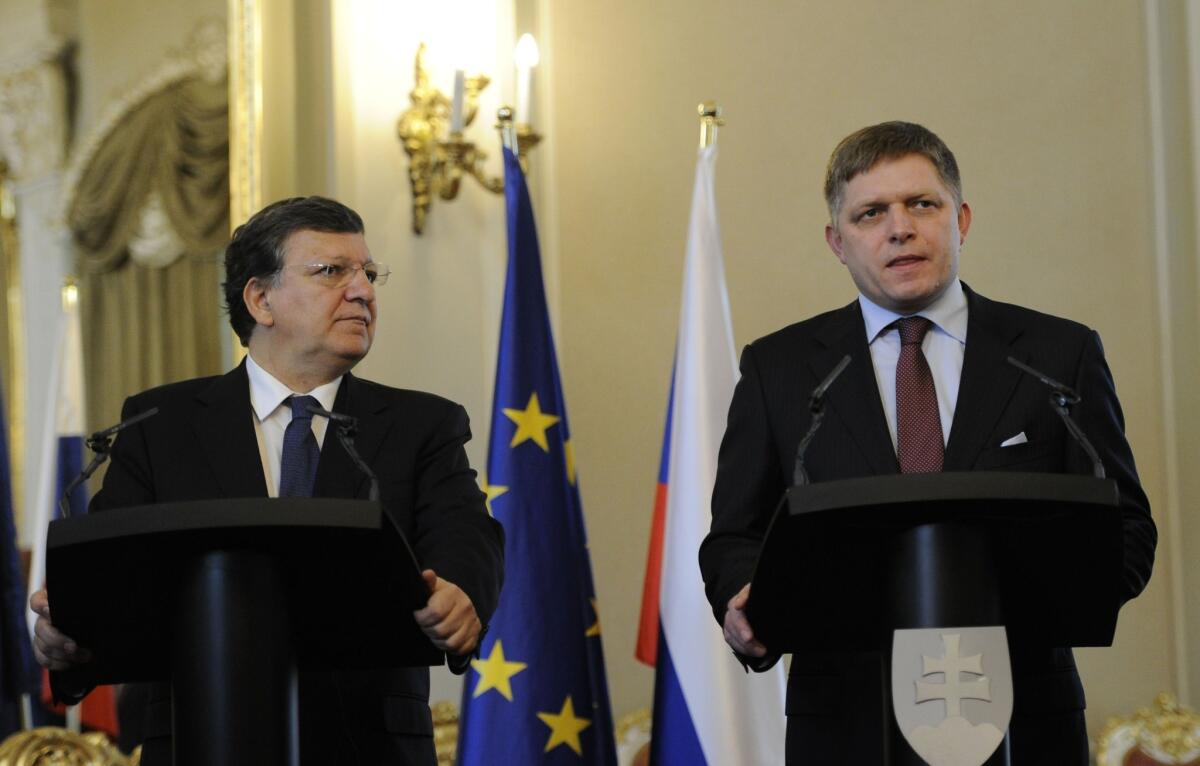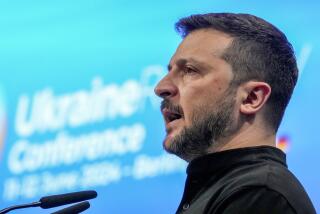Ukraine-Slovakia gas deal is first step out of dependence on Russia

Ukraine and Slovakia signed a natural-gas transport deal Monday in what European officials hailed as the first step toward reducing Ukraine’s heavy dependence on Russian supplies that are now more costly and at risk of being cut off as hostilities escalate between the two former Soviet republics.
The agreement signed in the Slovakian capital, Bratislava, envisions annually rerouting more than 8 billion cubic meters of natural gas from Russia and other suppliers to Ukraine through Slovakian pipelines, according to a summary of the deal provided by the European Commission. That would make up almost a third of the 28 billion cubic meters of gas Ukraine imported from Russia last year in the event Moscow follows through on threats to cut off Kiev.
The plan was brokered by European Union officials with the stated objective of securing energy supplies for Ukraine as it struggles to deal with separatist aggression in its largely Russian-speaking eastern regions. But the deal may also reflect the West’s preference for targeting Russia’s financial institutions rather than its energy trade if further sanctions are imposed to punish Kremlin aggression against Ukraine.
EU states import about a third of their natural gas from Russia, and any boycott of gas or oil purchases from Moscow would hurt the European economies as much as Russia’s. Russia’s Gazprom monopoly operates so inefficiently and has extended so many differing contracts with Western European buyers that it barely breaks even on its gas sales to EU states and utilities, said Keith Crane, head of Rand Corp.’s environment, energy and economic development program.
Russia this month boosted the price of gas to Ukraine by more than 80%, rescinding a discount offered Kiev last year when the Kremlin was trying to deter then-President Viktor Yanukovich from entering into an economic association agreement with the European Union.
The Russian legislature revoked another discount this month that was part of Moscow’s lease arrangement for its Black Sea fleet naval base in Crimea. Russian troops seized the whole Crimean peninsula from Ukraine after Yanukovich was toppled in late February. The State Duma then passed a measure canceling the rent-related discount because the base is under Russian control.
It was Yanukovich’s unilateral decision in November to stay economically integrated with Russia instead of pursuing closer ties with the West that sparked a three-month rebellion that ended with the president’s ouster and appeal for refuge in Russia.
Tens of thousands of Russian troops are massed on Ukraine’s eastern border, and separatist actions in a dozen eastern Ukrainian towns and cities are believed by Kiev authorities to be instigated by Russia in preparation for further territorial seizures.
Russian President Vladimir Putin and other Kremlin officials insist that the interim leadership that took power in Kiev after Yanukovich fled is illegitimate and not authorized to negotiate on the country’s behalf. To step up pressure on those trying to govern Ukraine ahead of the May 25 presidential election, Gazprom this month warned Kiev that future natural gas shipments will require prepayment as of May 1 and at the new rate of $485 per thousand cubic meters, up from $268.50 charged when Yanukovich was in office.
Ukraine traditionally has imported more than half of the natural gas it consumes, the vast majority from Russia. Last year it bought only 2 billion cubic meters from Europe out of the 55 billion it used. The deal signed Monday involves ramping up that eastward flow to an 8-billion-cubic-meter annual rate by September.
Slovakia and other EU member states have also committed to exploring other transport options through Eastern Europe that could more than double the volume redirected to Ukraine to 16 billion to 17 billion cubic meters per year, Slovakian Prime Minister Robert Fico told reporters after the signing ceremony.
Slovakia has a contract with Gazprom to import and sell 50 billion cubic meters of Russian gas each year and has pipeline capacity to transport 90 billion cubic meters, the Kyiv Post reported, describing the potential for increased supply from Ukraine’s western neighbor.
“This is an important first step to diversify Ukraine’s sources of gas supply and contributes to greater energy security in Eastern Europe and the EU as a whole,” European Commission President Jose Manuel Borroso said of the Bratislava deal.
Although the deal isn’t expected to inflict much damage on Gazprom’s bottom line, Crane notes that Putin’s Crimea gambit and fomenting of unrest in eastern Ukraine have dealt a severe blow to the Russian economy and its energy trade.
“They’ve shot themselves in the foot,” he said of the Kremlin’s military aggression that has scared away foreign investment and sent billions in capital fleeing abroad.
“This whole increased risk premium really hammers Russia,” Crane said. “Growth is probably going to be negative this year.”
If the United States and the EU decide to step up sanctions, he predicted, they will probably be targeted at Russian financial institutions that rely on foreign capital to finance important development projects, leaving companies like Gazprom with only Russia’s depleted treasury from which to borrow.
Twitter: @cjwilliamslat
More to Read
Sign up for Essential California
The most important California stories and recommendations in your inbox every morning.
You may occasionally receive promotional content from the Los Angeles Times.











